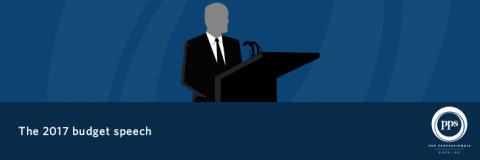2017 Budget speech

What I took from this year’s budget speech
As expected, Finance Minister Pravin Gordhan delivered a difficult budget speech during a tough economic period.
Our economic outlook as a country looks grim, with growth expected to be marginally higher at 1%, 0.5% higher from last year. South Africa still faces the threat of a ratings downgrade, with all efforts geared towards avoiding it.
Another sign of the tough economic times we are facing is the fact that far less revenue was collected than initially expected. It was sobering to learn that for the first time in 25 years, South Africa had failed to reach its projected tax revenue target.
The economic picture that was painted reminded us of how raw the economy is, and that not all the news headlines were “faked” as we were sometimes led to believe. The minister acknowledged that the slow economic growth was not enough to encourage financial growth or create jobs, which ultimately affect the collection of VAT, personal income tax, and excise duty. All of this has created a deficit of R28 billion.
How will we fund the R28 billion?
- From 1 March 2017, a super tax bracket, of 45% - up from 41% -will be introduced for those that earn more than R1.5 million. This is known as progressive tax - where when one earns more, they are taxed more. This new tax will add an additional R16.5 billion to the state’s coffers.
- Dividend Withholding Tax (tax withheld from dividend payments) will also increase to 20%, formerly 15%. This will result in an additional tax collection of R6.8 billion.
- The fuel levy increased by 30c per litre for the general fuel levy and a further 9c per litre for the Road Accident Fund levy.
- It seems the minister gets joy out of the “sin taxes” dialogue. As has become usual, tax on cigarettes and alcohol will go up by between 6% and 10%, in some instances way above general Consumer Price Index (CPI).
- Taxpayers earning between R75 750 – R1.5 million will not receive the full relief from the fiscal drag, i.e. the impact of inflation on the tax brackets, so they should not expect much out of the slight increase in the salary they typically see on their payslips at the end of March.
Where we got lucky
Given the above economic picture, it could have been worse for South Africans, but the minister did manage to spare us a little bit.
- It has been widely speculated that the minister would increase VAT, luckily, this was not the case, and no intentions about this were mentioned for this year. Capital Gains Tax was also left unchanged.
- The threshold for tax-free income, what’s generally referred to “bracket creep”, was marginally increased from R75 000 to R75 750 taxable income per year. This means individuals earning less than R75 750 will not pay any personal income tax.
- For new homeowners, the threshold on transfer duty has been increased from R750 000 to R900 000. This aims to make housing, which should be viewed as a long-term asset, more affordable. So people buying homes with a value of less than R900 000, will effectively be saving 3% on transfer duty, which amounts to R4 500. I am sure every new homeowner will appreciate that saving, given all the other expenses that come with buying property.
- The annual allowance for tax-free savings accounts has been increased to R33 000, up from R30 000). The minister made it clear that there will be incentives for those who save now and are less dependent on that state.
- Medical aid credit was increased by CPI.
What to expect later this year
- Implementation of the much debated sugar tax will be carried out later this year, with some of the detail surrounding the tax being in finalization stages.
- Carbon tax duty is also on the cards for later this year, so consumers should think carefully when purchasing a vehicle.
- Although the minister mentioned the important role that the financial services industry plays in the economy, he also stated that more regulation will be implemented.
- New measures on how to combat tax evasion are being reviewed. Therefore, individuals who have anything to declare, have time to do so by until 31 August 2017.
- Medical tax credits are likely to be reviewed going forward, even though they were increased slightly with CPI in the budget.
- The automatic exchange information between tax authorities will come into operation in September – so have your tax affairs in order if you work in multiple jurisdictions.
Lessons learned from budget
- Plan your car trips carefully or use public transport because the fuel price is going to get very expensive.
- Drink more water and less cool drink, wine, spirits, beer etc. This will prove to be beneficial for your insurance underwriting purposes.
- Make SARS your friend and take advantage of the Special Voluntary Disclosure Programme before end August.
- It’s going to be a bumpy ride ahead, so use your taxes wisely and save where you can, whether your choose to go the tax-free savings route or any other mode.
For a summary of the 2017 budget highlights, click here
Motshabi Nomvethe
Technical Marketing Specialist
https://www.pps.co.za/2017-budget-speech

